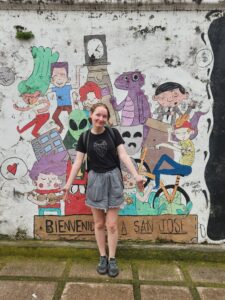A few years ago, I went to see the movie “Brooklyn” on New Year’s Eve with my sister. I cried intermittently throughout the whole movie — not because it was sad, but because it’s just a movie that evokes a lot of emotion. Shortly after, I read the book (I don’t usually do things backward like that but sometimes it happens), and I decided that for once, I preferred the movie. I loved them both, but the movie included a scene that the book did not, and I found it to be crucial to the conclusion of the story.
For those of you who haven’t seen it, “Brooklyn,” in summation, is about a young woman who moves from Ireland to Brooklyn, New York, in the 1950s. On the way there, she’s kind of a mess; she’s alone on a ship full of people, she’s violently seasick, she’s overwhelmed, and quite frankly, she seems kind of lost in every way. In contrast, at the very end of the movie, the young woman visits her family in Ireland and once again returns to Brooklyn, but this time around, Brooklyn is what she considers home. On the ship, she encounters a young woman who’s just like she was on that first trip to New York: clueless, scared and in need of some serious help. So she gives the young woman a few simple pieces of advice, nothing too sappy, all reflecting what she learned on her first trip over, and the movie ends with that. It’s one of the most wholesome scenes of any movie I’ve ever watched. I cried again at this part, obviously.
When I showed up in Tel Aviv in January, I got my two giant suitcases from baggage claim and then kind of just stopped in my tracks in the middle of the airport, realizing I had absolutely no clue what to do next. I knew I needed a train or a taxi, and I had an address I needed to get to, but I really had no clue how to actually make it from point A to point B. Nearly everything in Israel is in Hebrew, which is a completely different alphabet so it’s impossible to even infer what a sign might say. Somehow, by asking someone every 15 steps I took if I was going the right way I made it almost to my destination by taking the train. Then I gave up and found a taxi. And got totally ripped off, of course.
On Wednesday, I landed back in Tel Aviv from Cyprus and, similarly to when I returned from my last trip to Europe at the end of February, I felt a sense of relief when I looked out the window and spotted the skyscrapers of Tel Aviv below me, even managing to find my own building. When I got off the plane, I headed to the train platform and was about to get my ticket when I saw a girl about my age whose demeanor absolutely screamed that she was American and very lost. She looked just like I did three months ago.
I approached her, asked if she needed help, and she, visibly relieved, told me where she needed to go. It happened to be the same stop as me, so I got her a train ticket and rode with her until we got off, where I pointed her in the direction of where she was going and was able to tell her (almost to the exact minute) how long it’d take her to get there on foot. Then I turned in the direction of my building and went home.
The girl’s name was Hunter, and she’s from Florida but has come to Israel until August to live and work on a Kibbutz. A Kibbutz is a type of self-sustained community, found only in Israel where people work to fulfill the needs of the community and, in turn, live there in exchange for their work. They were originally based off agriculture and the first one was founded in 1910, shortly after people started immigrating to Israel (making Aliyah). All members of a Kibbutz have different jobs, from working in the kitchen to working in agriculture, and there’s even a dining hall for the members to eat community meals in. Originally, most things in a Kibbutz were shared, and even today many Kibbutz still live this way. About a week ago, I was re-watching an episode of “Gossip Girl” (great educational television) and one of the characters joked about moving to Israel to take up a relative’s invitation to live on a Kibbutz – the line was humorous, but life on a Kibbutz really is a perfect escape from the rush of the real world for a little. I can’t deny that I’d love to do what Hunter’s doing for a few months. Life on a Kibbutz is very unique, and there’s a lot to learn from living in such a simplistic community.
After I left Hunter at the intersection and she headed towards her destination, I immediately thought of the end of the movie “Brooklyn.” I thought of how I felt when I first got here, how foreign everything seemed to me, how lost I was, how grateful I was to everybody I asked for help. I would have been so relieved to find another American my age to help me out a bit that day. It’s an incredibly wholesome feeling being on the other end of it, being the one to help, realizing I actually know more than I thought about this city I’ve been living in. By no means am I a local, exactly — I still forget about the lack of busses and stores on Shabbat sometimes, and my Hebrew is slow and requires much patience — but when I’m in Tel Aviv, I no longer feel like somebody who’s merely studying abroad here. I feel at home.








